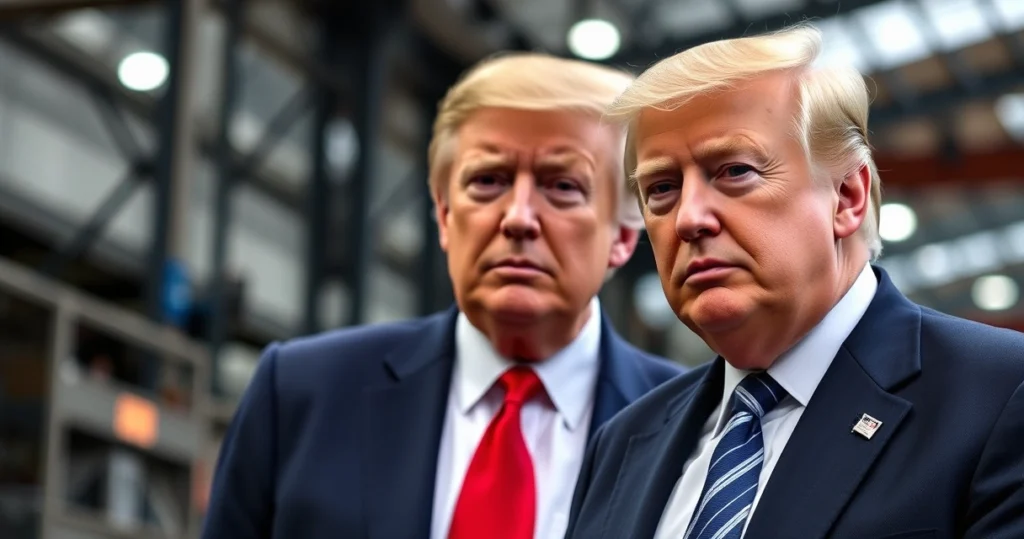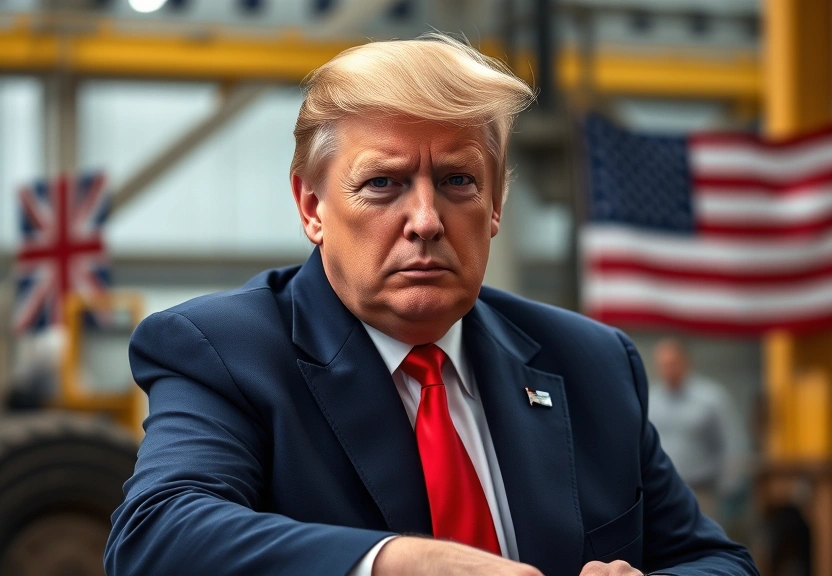
Trump’s Steel Tariff Hike to 50% ‘Would Be a Heavy Blow to British Industry’ – With Keir Starmer’s US Trade Deal Still Pending
Date: 31/05/2025 | Source: Bing US
Tags: 1. Trump steel tariffs 2. Impact on UK industry 3. Keir Starmer trade deal 4. British manufacturing challenges 5. US-UK trade relations
During a visit to a steel plant in Pittsburgh, Pennsylvania, former President Donald Trump announced plans to increase steel tariffs on imports from 25% to a staggering 50%. This move, aimed at “further securing” the American steel industry, has raised concerns among British business leaders and policymakers, particularly as the UK seeks to strengthen trade ties with the United States through Labour leader Keir Starmer’s proposed trade deal. The tariff increase could severely impact UK manufacturers, triggering ripple effects across various sectors of the British economy.

Effects of the Tariffs on British Businesses
This new tariff policy poses a significant threat to the UK’s industrial sector. Already facing challenges such as rising costs and international competition, the announcement comes at a particularly precarious time.
Immediate Consequences for UK Steel Imports
- Higher costs: The increased tariff is likely to raise the cost of steel imports, making it more expensive for British manufacturers.
- Supply chain disruptions: UK companies may face delays and difficulties adapting to the new tariff structure, potentially affecting production timelines.
- Competitive disadvantage: UK manufacturers might struggle to compete with their US counterparts, who benefit from protectionist measures.
Long-Term Economic Impact
Experts warn that the long-term effects of these tariffs could be significant:
- Decline in investment: Higher costs may deter investors from entering UK manufacturing sectors that rely heavily on steel.
- Job losses: Increased production costs could lead to layoffs, further straining the UK economy.
- Tensions in trade relations: These tariffs could deepen tensions between the US and the UK, complicating future negotiations for favorable trade terms.
Keir Starmer’s Trade Deal with the US Still in Limbo
While the UK grapples with the fallout from the steel tariff increase, the status of Keir Starmer’s proposed trade deal with the United States remains uncertain, leaving UK businesses in a state of limbo.
Current Status of Negotiations
Despite ongoing talks, the absence of a formal agreement raises questions about the effectiveness of Starmer’s trade strategy. Key points of focus include:
- Tariff negotiations: The UK is seeking to negotiate lower tariffs on various goods, but the recent hike in US steel tariffs complicates these discussions.
- Regulatory alignment: Starmer’s government aims to align UK regulations with those of the US, potentially facilitating smoother trade flows.
- Political challenges: Political dynamics, both in the UK and the US, present obstacles to reaching a trade agreement.
Potential Benefits of a Trade Deal
If successfully negotiated, a trade deal with the US could offer several benefits for the UK:
- Access to the US market: Greater access to the American market could create new growth opportunities for UK businesses.
- Economic boost: Improved trade relations could stimulate the UK economy, creating jobs and encouraging investment.
- Trade diversification: A successful deal could help the UK reduce reliance on the EU by diversifying its trading partners.
Challenges Facing UK Manufacturing
In addition to the immediate impact of Trump’s steel tariffs, the UK’s manufacturing sector faces a host of challenges that make recovery and growth more difficult:
Rising Operational Costs
- Energy prices: Volatile energy prices are increasing operational costs across the manufacturing sector.
- Supply chain disruptions: Ongoing issues from global supply chains, compounded by the COVID-19 pandemic, are causing material shortages.
- Labor costs: As businesses strive to attract skilled labor, rising wages are further driving up operational expenses.
Global Competition
- Loss of market share: UK manufacturers face stiff competition from international markets, especially countries with lower labor costs.
- Innovation stagnation: The pressure to reduce costs may stifle innovation, hindering long-term growth.
- Product quality concerns: Intense price competition may force companies to compromise on product quality, damaging their reputation.
Context of US-UK Trade Relations
The trade relationship between the US and the UK has always been crucial, but recent developments raise questions about its future direction.
Historical Context
- Post-WWII agreements: Early trade agreements laid the groundwork for strong economic ties between the two nations.
- Shifts in trade policy: Recent policy changes, particularly under the Trump administration, have introduced significant uncertainty into trade relations.
- Brexit implications: The UK’s departure from the EU has created a need for new trade agreements, making US-UK relations all the more vital.
Future Outlook
Looking ahead, the future of US-UK trade relations will depend on several factors:
- Political will: Both governments will need to be committed to engaging in constructive dialogue.
- Mutual interests: Identifying common economic interests can help pave the way for beneficial agreements.
- Global economic trends: Broader shifts in global supply chains and economic patterns will affect the future of trade relations.
Frequently Asked Questions
What are Trump’s steel tariffs?
Trump’s steel tariffs are import duties imposed on foreign steel to protect the US steel industry from international competition. The tariffs were recently doubled from 25% to 50%.
How will these tariffs affect the UK industry?
The increased tariffs could raise costs for UK manufacturers who rely on imported steel, potentially causing supply chain disruptions, job losses, and making UK companies less competitive.
What is the current status of Keir Starmer’s trade deal with the US?
As of now, the proposed trade deal has not been formally signed, leaving UK businesses uncertain about future trade relations.
What challenges does British manufacturing face?
The UK manufacturing sector is dealing with rising operational costs, global competition, and supply chain disruptions, all of which complicate recovery and growth prospects.
What is the future outlook for US-UK trade relations?
The future of US-UK trade relations will depend on political will, mutual economic interests, and the broader global economic landscape.
Conclusion
Trump’s decision to double steel tariffs presents a serious threat to British industry, especially as the UK attempts to redefine its trade strategy with the United States. The potential consequences for UK manufacturers could lead to significant economic challenges, further exacerbated by ongoing pressures within the sector. As both countries move forward, the focus must shift to building resilient trade relations that can withstand the turbulence of global economic changes and foster mutual growth.